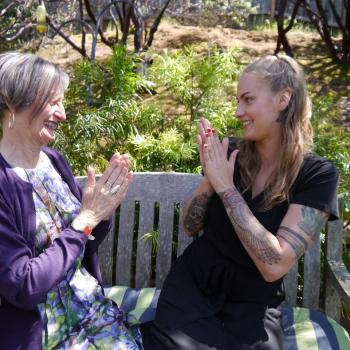During a recent couples counseling session, Tim, 38, spoke about how overwhelmed he feels when Samantha, 37, gets upset with him and shares her frustrations. According to Samantha, he tunes her out and often retreats to another room or watches sports.

Tim reflects: “I love Sam and want to make her happy but when she bombards me with intense feelings, it’s more than I can handle so I usually bail out. I do feel badly and we sometimes talk later, but she often shuts down then.”
Communication problems such as the one described by Tim and Samantha are common for couples who have different styles of relating. In order to gain more information to help couples with this pattern, I researched articles by couples therapists.
In a recent article for Greater Good Magazine, San Francisco-based therapist Linda Graham offers insights gleaned from 25 years of experience working with couples in conflict. The piece, entitled “Three Steps To Understanding Your Partner’s Emotions,” also draws on a recent academic study published in The Journal of Family Psychology about the benefits of counseling and the kind clear communication it fosters. Researchers in this study focused on couples participating in conflict resolution sessions who shared their emotions around recurring problems and sought to “investigate whether greater expressions of feelings on the part of the sharer correlated with greater empathic accuracy on the part of the perceiver.”
The study ultimately found that “any clear expression of one partner’s emotional experience of the moment does greatly increase the accuracy of the perception of the other partner in that moment. In other words, “it really doesn’t pay to hide your feelings in couples therapy.”
So, informed by her decades of clinical experience and the latest research in the field, Graham boils down her strategy for improving communication in three simple steps. The first step is particularly astute because it isn’t necessarily intuitive. When most partners communicate about a conflict, they often share their emotions passionately and all at once. Imagine the common analogy of a pot boiling over, for example.
But rather than allowing the rush of emotion and information to overcome a conversation, Graham counsels couples to “Chunk it Down.” In other words, partners should share “one bite-sized piece of information, one thought or feeling at a time” because “there may be many feelings and thoughts swirling around each other that need to be unpacked, named, honored.”
Graham’s second step is “Pause.” A practical strategy in any high stakes communication, stopping to process and parse things out will only lead to a deeper understanding and empathy. Graham observes that “when couples are in high conflict, this pausing is essential for the conversation to stay on the rails.”
Finally, Graham’s third step is to “Reflect.” A natural extension of the first two steps in her process, Graham notes that “the practices of chunking it down and pausing give both partners more time to consciously process feelings and thoughts, and to reflect rather than react. The speaker becomes more aware of the evolution of their own feelings and thoughts.”
This act of conscious reflection is a practical evolution of Graham’s overall strategy and is aimed at create a feeling of safety for couples in the throes of emotional responses engendered by counseling. As she puts it, taken together, the three steps “create the felt sense of safety within the couple that encourages honest, open communication, and gives them time to regulate their emotions, all of which creates more safety.
Follow Terry Gaspard on Twitter, Facebook, and movingpastdivorce.com. Her award-winning book Daughters of Divorce: Overcome the Legacy of Your Parents’ Breakup and Enjoy a Happy, Long-Lasting Relationship is available on her website. Feel free to ask a question here.
Terry’s award-winning book, The Remarriage Manual: How to Make Everything Work Better the Second Time Around, was published by Sounds True in February of 2020.
















